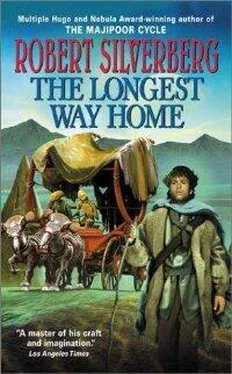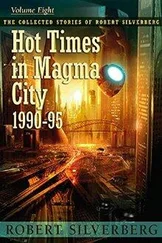There, Joseph thought, with a hot burst of satisfaction. He had done it. Matagava, indeed! “Bind the arm the way you bound my leg,” he told Ulvas, no supplication this time, simple instruction, and moved to the next patient.
But the third case was a baffling one. What was he supposed to do about a swollen abdomen? He had no way of making a rational diagnosis. Perhaps there was a tumor in there, perhaps it was an intestinal blockage, or perhaps—this patient was another female—the problem was a complication of pregnancy. But, though he had blithely enough talked himself into going through with this medical masquerade, Joseph’s audacity did not begin to extend to a willingness to perform a surgical exploration of the patient’s interior. He had no notion of how to go about such a thing, for one—the thought of trying to make an incision in living flesh brought terrifying images to his mind—nor would there be any purpose in it, anyway, for he had no inkling of internal Indigene anatomy, would not be able to tell one organ from another, let alone detect any abnormality. So he did nothing more than solemnly pass his hands up and down over the patient’s taut skin with a kind of stagy solemnity, feeling the strangeness again, that cool dry inorganic unreality, lightly pressing here and there, as though seeking by touch alone some understanding of the malady within. He thought he should at least seem to be making an attempt of some kind at performing an examination, however empty and foolish he knew it to be, and since he did not dare do anything real this would have to suffice. He was, at any rate, unable to feel anything unusual within the abdominal cavity by these palpations, no convulsive heavings of troubled organs, no sign of some massive cancerous growth. But then, thinking he should do something more and obeying a sudden stab of inspiration, Joseph found himself making broad sweeping gestures in the air above the Indigene and intoning a nonsensical little rhythmic chant, as primitive witch-doctors were known to do in old adventure stories that he had read. It was sheer play-acting, and a surge of contempt for his own childishness went sweeping through him even as he did it, but for the moment he was unable to resist his own silly impulse.
Only for a moment. Then he could no longer go on with the game.
Joseph looked away, embarrassed. “For this one I am unable to do anything further,” he told the Ardardin. “And you must allow me to lie down now. I am not well myself, and very tired.”
“Yes. Of course. But we thank you deeply, Master Joseph.”
He felt bitter shame for the fraud he had just perpetrated. Not just the preposterous business at the end, but the entire cruel charade. What would his father say, he wondered? A boy of fifteen, posing as a doctor? Piously laying claim to skills he did not in any way possess? The proper thing to do, he knew, would have been to say, “I’m sorry, I’m just a boy, the truth is that I have no right to be doing this.” But they had wanted so badly for him to heal these three people with the shining omnipotent human matagava that they knew he must have within him. The very grammar of the Ardardin’s request had revealed the intensity of their desire. And he had done no real harm, had he? Surely it was better to wash and bind a gash like that than to leave it open to fester. He felt confident that he had actually set that broken arm properly, too. He could not forgive himself, though, for that last bit of disgraceful chicanery.
His leg was hurting again, too. They had left a beaker of the succulent-juice by his bedside. He took enough of it to ease the pain and slipped off into a fitful sleep.
When he awoke the next day he found that they had set out inviting-looking bowls of fruit at his side and had put festive bundles of flowers all around his chamber, long-tubed reddish blossoms that had a peppery aroma. It all looked celebratory. They had not brought him flowers before. Several Indigenes were kneeling beside him, waiting for him to open his eyes. Joseph was beginning to recognize the distinct features of different individuals, now. He saw Ulvas nearby, and another who had told him yesterday that its name was Cuithal, and a third whom he did not know. Then the Ardardin entered, bearing an additional armload of flowers: plainly an offering. It laid them at Joseph’s feet and made an intricate gesture that seemed certainly, alien though it was, to be one of honor and respect.
The Ardardin earnestly inquired after the state of Joseph’s health. It seemed to Joseph that his leg was giving him less discomfort this morning, and he said so. To this the Ardardin replied that his three patients were greatly improved also, and were waiting just outside in the hallway to express their thanks.
So this will go on and on, Joseph thought, abashed. But he could hardly refuse to see them. They came in one by one, each bearing little gifts to add to those already filling Joseph’s room: more flowers, more fruit, smooth-sided ceramic vessels that his father would gladly have owned, brightly colored weavings. Their eyes were gleaming with gratitude, awe, perhaps even love. The one who had had the infected wound in her thigh looked plainly less feverish. The one with the broken arm—it had been very nicely bound by Ulvas, Joseph saw—seemed absolutely cheerful. Joseph was relieved and considerably gratified to see that his amateur ministrations had not only done no harm but seemed actually to have been beneficial.
But the great surprise was the third patient, the one with the swollen abdomen, over whom Joseph had made those shameful witch-doctor conjurations. She appeared to be in a state of transcendental well-being, wholly aglow with radiant emanations of health. Throwing herself at Joseph’s feet, she burst forth with a gushing, barely coherent expression of thankfulness that was almost impossible for him to follow in any detailed way, but was clear enough in general meaning.
Joseph hardly knew how to react. The code of honor by which he had been raised left no room for taking credit for something you had not done. Certainly it would be even worse to accept credit for something achieved accidentally, something you had brought about in the most cynical and flippant manner.
Yet he could not deny that this woman had risen from her bed of pain just hours after he had made those foolish conjurations above her body. A purely coincidental recovery, he thought. Or else his idiotic mumblings had engendered in her such a powerful wave of faith in his great matagava that she had expelled the demon of torment from her body on her own. What could he say? “No, you are mistaken to thank me, I did nothing of any value for you, this is all an illusion?” He did not have the heart to say any such things. There was the risk of shattering her fragile recovery by doing so, if indeed faith alone had healed her. Nor did he want to reject ungraciously the gratitude of these people for what they thought he had done for them. He remained aware that he was still dependent on them himself. If a little inward embarrassment was the price of getting himself from here to Ludbrek House, so be it. Let them think he had worked miracles, then. Perhaps he had. In any event let them feel obligated to him, because he needed help from them. Even the honor of a Master must sometimes be subordinated to the needs of sheer survival, eh, Balbus? Eh?
Besides—no question about this part of it—there was real satisfaction in doing something useful for others, no matter how muddledly he had accomplished it. The one thing that had been dinned into him from childhood, as the heir to House Keilloran, is that Masters did not simply rule, they also served. The two concepts were inextricably intertwined. You had the good luck to be born a Master instead of one of the Folk, yes, and that meant you lived a privileged life of comfort and power. But it was not merely a life of casual taking, of living cheerfully at one’s ease at the expense of hardworking humbler people. Only a fool would think that that was what a Master’s life was like. A Master lived daily in a sense of duty and obligation to all those around him.
Читать дальше












